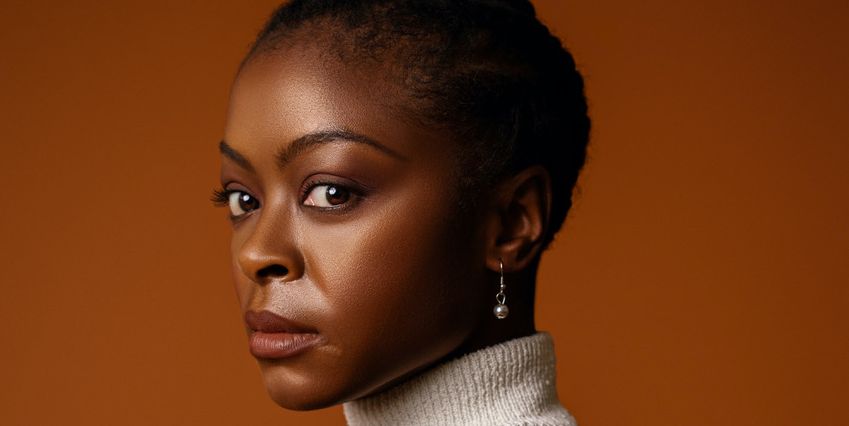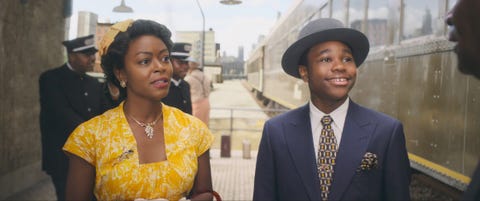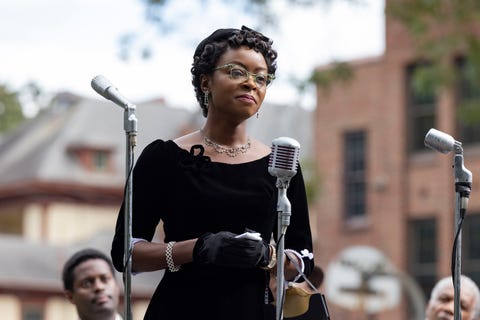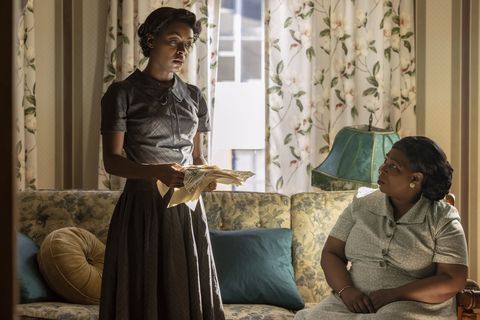Minor spoilers for Till below.
At its core, Till is an intimate portrait of a mother’s love shattered by hatred. Danielle Deadwyler’s portrayal of Mamie Till-Mobley is cerebral and handled with masterful care. She shines, delivering a transformative performance that skillfully showcases the palpable pain Till-Mobley channeled into a historic fight against racial injustice. “To step into the role of Mamie was an extremely nervous and trepidatious undertaking,” Deadwyler says. “She was doing things in an extraordinary way before having to deal with the very public mourning that dropped her onto the national and global scene.”
In theaters Oct. 14—with supporting cast members including Whoopi Goldberg, who plays Mamie’s mother, Alma Carthan, and Sean Patrick Thomas, who plays her husband, Gene Mobley—the film’s dramatization of the 1955 killing of Emmett Till focuses on the immediate aftermath and follows Mobley-Till’s journey to justice. Chinonye Chukwu, Till’s director, says making the film from the perspective of Till-Mobley, an inconsolable mother who turns within for strength after insurmountable grief, was an “opportunity to delve into her complex humanity as a multi-faceted Black woman. Black women are often erased from history, so the opportunity to center the film on this Black woman, who galvanized a nation and was the catalyst for a modern-day Civil Rights Movement, was of utmost importance to me.”
Strikingly, Chukwu intentionally did not show the horrific hate-filled attack on the 14-year-old, though she does show how it decimated his body. She artfully progresses the film by revealing the echoing nationwide impact of his lynching while depicting the contrasting cultures of the North and South, a critical understanding, or lack thereof, that underpinned the teen’s death. Till was killed in Mississippi while visiting from Chicago and didn’t understand the drastic difference in social norms, like how speaking to, let alone whistling at, a white woman in the South could be deadly.
And though Till’s lynching forever transformed racial dynamics across America, the unimaginable deaths of Black people at the hands of bigotry have not stopped. That’s the primary reason Chukwu, whose 2019 breakthrough film Clemency examined the death penalty and won the Grand Jury Prize at Sundance, felt the time was ripe to tell this well-trodden story: She sees how present-day fights for equity parallel those fought for decades. “Racialized violence still exists in our world today,” she says. “States are actively passing legislation to make it illegal to teach true stories like Mamie and Emmett Till’s within classrooms, and we are still fighting for voting rights and against disenfranchisement. These are themes explored within the film that still remain relevant today.”
The film also illustrates that as Mamie fights for her son, she quickly discovers that her one-of-a-kind stand against intolerance extends beyond just herself – it was for an entire people and, as we’ve seen it, for subsequent generations. She witnessed Black America mourn with her as she remained resilient and persevered through every breath and step in her fight for accountability. All of which is captured in Deadwyler’s performance throughout Till as she shoulders the film. She channeled “Mamie—mind, body, and spirit,” Chukwu says of the film’s leading woman. “She gave her full self to this role and had an inherent…understanding of who Mamie was.”
Deadwyler, who was recently in Netflix’s groundbreaking Black Western, The Harder They Fall, credits the time she spent engaging “with all the things that made Mamie [who she was], to keep me in the zeitgeist of what it means to be this type of monumental figure,” including reading Till-Mobley’s memoir, Death of Innocence: The Story of the Hate Crime That Changed America, to help her get into character. “I dug into the humanity of Mamie, her very private life, and what her experience was like as a young, prosperous Black woman and mother.” At the same time, she says she fully grasped the consequence of the role and dived into it “understanding the weight I was taking on.”
Below, Deadwyler further describes how she prepared for the role, the lasting impact of Till-Mobley and her son’s death, and how the filming experience was a “great joy.”
How did you prepare for such an iconic role?
In a traditional preparatory fashion, I began with pure research, digging into the Bible that was Mamie’s memoir. I leaned into the intimate stories and details of how she raised Emmett, his birth experience, and what early motherhood felt like for her. Then I dug into a wealth of visuals through archival footage and photos. I specifically examined the court trial: what that engagement looked like with her and the contrast of being in a very white, racist space. Chinonye dropped some songs on my lap that Mamie and Emmett listened to, which helped me better understand their loving bond. It put me in the world of her individuality, his individuality, and what it was like between them as mother and son.
I then spoke with several people, like Keith Beauchamp, who was Mamie’s mentee and one of Till’s producers and co-writers. I spent time with folks from Chicago who knew Mamie in her later life. They described how beautiful she was in the community as an educator and dear friend. I saw how many people engaged with her story on multiple levels, including poetically and artistically.
Though I know the true villain is racism, I had never characterized Carolyn Bryant—the woman who incited all of this—as a villain in this piece of history. But as I watched, that was a clear realization that cemented for me. And in contrast, Mamie was a different kind of heroic figure: a mother unwillingly thrust into becoming the face of the fight against racism and lynching and widespread attacks against Black America. What about the characterization of Mamie in the script jumped out at you, and how would you now characterize Carolyn Bryant, having walked in Mamie’s shoes?
I grew up in Atlanta, Georgia, so I’m deeply, deeply entrenched in what it means to be in the Civil Rights city. I grew up volunteering for the Southern Christian Leadership Conference. I grew up attending Cascade United Methodist Church, where Dr. Reverend Joseph Lowery was the pastor, and Dr. Martin Luther King, Jr. and Dr. Lowery were collaborators in SCLC. That is where my rearing comes from, so I know all about working and learning under unsung Black women. That was my entree into saying yes to the film because this is something that I’ve always known.
During the reading, I knew the importance Mamie plays in history. To be able to tell her story in this intimate way, paralleling it with the very public experience, was attractive because it gets to the heart of what it means to labor as a Black woman. The multi-faceted, interlocking layers of labor are the type of subjectivity I like to investigate in my work. I do it in performance art, I do it in theater, and I do it in film and TV. During the readings and while filming, I also thought about how my mother was born in 1955 (the same year Emmett Till was killed) and how, since I was a kid, I’ve known about the hate crime that forever changed this country. It’s one of those indelible images you can’t relinquish from your mind: the kind of treatment and terrorism enacted on Emmett’s body and done to intimidate Black folks.
When it comes to Carolyn Bryant, she’s not our center. She’s just another form of white racism that further ignites the way this type of hate crime happens and the way it spurs violence. She is the remaining individual who needs to be held accountable, and justice needs to be held for the Till family.
Seeing parts of Emmett Till’s kidnapping and hearing his death played out on screen and Mamie’s subsequent fight for justice was more agonizing than reading words in any history book. How did that play into how you channeled Mamie and the discernible ache you so profoundly portrayed?
It’s the coloring. It’s the coloring of life. We’ve only looked at black and white images and footage. And that goes for any kind of historical experience. When you think about the Civil Rights Movement, we’ve taken to it with a hyper binary understanding. And we’ve only looked at the men, right? We’ve largely looked at Dr. King. We’ve largely looked at Malcolm X. And for Chinonye to aesthetically bring us into the Black experience of that time—looking at the vibrant color of the South and the vibrant color of Black people who move from the South to the North—like that carries forward. So I just lived in that understanding that there’s always a greater texture. And that kind of detail is the intent of the emotional work that I did. At the end of the day, there’s nothing you can do with this kind of story and the weight of it without taking it day by day.
“He came to me reeking of racial hatred.” That’s a line you, as Mamie, say in the film after seeing Emmett’s body. What a powerful illumination, and the delivery was equally transfixing. I especially loved that the scene showcased how – going from the morgue to address the press outside—Mamie quickly channeled her grief into advocacy. Talk me through what filming that pivotal scene was like juxtaposed against the knowledge you had going in about what’s been widely documented and seen, like the famous Jet magazine photo that showed Emmett’s battered body—an image that forever changed the Civil Rights Movement.
Shooting that scene was deeply, deeply transformative. That’s the only scene I did in the director session (the initial audition), so I already had an emotional entrance into it. During that initial session, Chinonye and I worked on it several times to get to the heart of what that moment represented and how that scene can undulate the examination of Mamie’s emotions. It rises from a particular kind of sorrow into a sort of rage with a greater intention and purpose. It was also deeply humanizing. In Mamie’s memoir, three to four pages explain what she was thinking and enduring at the time. She explains that she had to go into that moment clinically, like a doctor or scientist, to detach herself. So, I lived purely in Mamie’s experience of what that was like for her.
When it came to filming the scene, it was a highly anticipatory feeling for me. The day we filmed it, I remember it was raining, and the set was eerily quiet. As with many other days, the general vibe on set that day was deeply entrenched in the trauma and gut-wrenching heartache of it all. We typically had a therapist on set, and that day was no different. But that day, they made a point to remind us they were available if anyone needed to talk. Because it’s not just me enduring and reliving this, it’s the other cast members and crew too. I also remember the camera department, unbeknownst to me until I got on set, dressed up in solidarity with me that day. They wore button-down white shirts and ties.
As the camera rolled and I walked into that morgue scene, it was the first time I had seen the body. It was deeply overwhelming. It’s a hard tension to try to withhold emotionality when you think about the kind of weight of the Black experience because, you know, everybody knows this moment. Everybody thinks of it as, “That could have been my cousin,” as James Baldwin often said in many ways during his lifetime. [i.e., “I am not a stranger. I am none of those things. On the contrary, for all you know, for all you know, I might be your uncle, your brother, your cousin, among other things.”] I carried on with the wherewithal that I was not stepping through this alone—the world would be stepping through this with me. And that just speaks to the remarkable nature of Mamie. I think that’s what she would’ve wanted.
While watching, especially the scene where Mamie goes to receive Emmett’s body and the agonizing distress shown, I thought about the clear parallels to mothers we’ve now known equally for the loss they’ve suffered. I thought about the mothers of Michael Brown, Eric Garner, Sean Bell, Trayvon Martin, etc.—all Black men and boys killed because of the underlying and unresolved racism in this country. Did playing this role shift your perspective on race and racism in America? Particularly when considering such killings, incited by bigotry and discrimination, haven’t ceased.
No, my perspective didn’t shift. It just proves that racism is an insidious disease. It further puts the onus on white America and shows the lasting white indifference to racism because Black people have been saying this for centuries. What is interesting in this film and with Mamie is the class dynamic. Mamie was economically more prosperous than the people who committed this act against her, yet she was less respected. She embodied elegance in presentation even in the midst of such a mournful terroristic thing.
Another jolting moment for me was when one of the NAACP leaders tells Mamie that Emmett’s death would finally push the government to make lynching a federal crime. Yet, it took over 67 years for the bill to pass—passing just this March. Considering you’ve now embodied Mamie and her wrenching experience, would you say she’d consider this bill justice? How would you characterize the bill?
It’s a form of symbolism because the justice Emmett’s family seeks is for the indictment and the accountability of Carolyn Bryant; that’s what it’d look like for Mamie and her family. It’s interesting to name the legislation after Emmett because advocates have been fighting for this act for a long time—apparently, 200 instances of trying to enact the bill. And it took 67 years to do so? And how many Black bodies and Black people and Black figures have died as a result of racism? And yet the one person (Carolyn Bryant) that was integral in this tragic loss doesn’t have to bear any responsibility? And the facts are present, and we waited that long, and we still don’t have justice? That doesn’t make any sense. One plus one is not three.
Alma Carthan, Mamie’s mother, was integral to her life. In the film, Whoopi Goldberg plays her, and she is breathtaking whenever we see her on-screen, especially as she mourns alongside Mamie. What was it like working with her, someone who has equally cemented her place in history as the first Black person to EGOT?
She’d been with the project for over 12 years. So, I came in with that weight working with her. But then, I thought about everyone else who was a part of the process of trying to make this film from the beginning, like Mamie, who tried in 1955. And, decades later, Whoopi swoops in with a kind of care that was resounding amongst everybody who had been trying to make this happen. It was special.
While filming, she did for me what Alma did for Mamie, take care of her baby. Whoopi took care of me in that same way. She advocated for me to have certain things when dealing with emotionality, like the number of takes I needed for particular scenes. And overall, she was just encouraging. What more do you need from somebody who quietly said “Yes” to you? “Yes, you are the person who should do this monumental thing,” and then to come on the film and literally, physically be present in supporting me and give that face-to-face intimacy, that expressed to me, “you’re doing what is necessary.”
Generally, what was it like on set and working with your other costars?
Everybody came in knowing the weight of what was to be done. There was always joy on set—great, great, great, great, great joy. Because we needed it. We would sing gospel songs like “I Won’t Complain” by Paul Jones – that one got a release to it. I’m not a gospel singer by no means, but songs like that were something that held us together and got us through.
The cast and crew were all terrific to work with. To name a few: Working with Tosin Cole (who plays NAACP leader Medgar Evers) and Frankie Faison (who plays Mamie’s father, John Carthan)—they were the jokesters—was a joy. We were like the three musketeers on set, and we were together for a good while. Kevin Carroll (who plays Mamie’s cousin, Rayfield Mooty) was also so dynamite. That’s my dude.
And most of my scenes with Jalyn Hall (who plays Emmett Till) gave me the ability to come off a little bit on that weight. Even though those scenes were moments where Mamie’s intuitive fear is living in her as a mother, he was just a joy to work with. That boy smiles all the time. He’s so charismatic. He’s been that way since the day I met him when we did the audition—he’s just so charming. He’s the epitome of joy in the way that Emmett was.
What do you hope audiences take away from this film?
I don’t want to give an assignment to anyone watching, but I think we should all ask ourselves, “How do you find your way to activism?” Mamie feared she’d be the only one championing her son’s story. So I guess that should be integral for folks: How do you continue to champion this story? How do you connect the dots of what this story is about and how it is attached to the stories still happening? And how do you alchemize your ordinary into the extraordinary? We see Mamie find her way into a particular power. Moving from, in her words, “going from a nobody” and coming into a unique, extraordinary power through a very national tragedy. That is something that we can all take lessons and purpose and intention from.
This interview has been edited and condensed for clarity.
Rita Omokha is a freelance writer based in New York who writes about culture, news, and politics.



